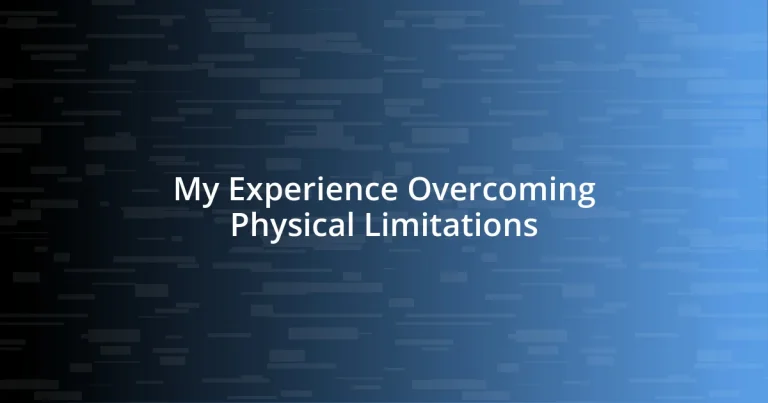Key takeaways:
- Understanding and accepting physical limitations can lead to greater self-discovery and emotional resilience.
- Setting small, achievable goals and celebrating milestones fosters motivation and a positive mindset during recovery.
- Sharing personal experiences creates connection and support, inspiring others to reframe their own challenges.

Understanding Physical Limitations
Understanding physical limitations goes beyond merely recognizing what we can’t do; it involves a deep emotional and psychological journey. I vividly remember feeling frustrated after a knee injury sidelined me from activities I cherished, like hiking with friends. It made me question—how do we define ourselves when our bodies don’t cooperate?
As I navigated this challenge, I learned that physical limitations are often intertwined with our mental resilience. During my recovery, I discovered adaptive exercises that became a lifeline for both my body and spirit. This experience taught me that our limitations don’t necessarily dictate our potential; rather, they can inspire creativity and determination in how we choose to move forward.
Reflecting on this, I often wonder how many others feel similarly trapped by their own physical constraints. I remember encountering individuals at a rehabilitation center who, despite their struggles, found joy in small victories like balancing or lifting weights. Their unwavering spirits reaffirmed my belief that understanding our physical limitations can ultimately lead us to greater self-discovery and empowerment.

Exploring Personal Challenges
Exploring personal challenges is often a multifaceted endeavor. I recall my early days after my injury; it felt like I was navigating through a fog. Each day was a mix of small triumphs and setbacks, like the time I managed to walk for 10 minutes without pain. That achievement, however minor it seemed, was a beacon of hope. Each step felt like a metaphorical leap towards reclaiming a part of myself.
The emotional landscape during this period was complex. There were moments of despair, like when watching my friends hike without me. Yet, those very moments fueled my determination to adapt. I started to explore new activities, such as swimming. I found an unexpected sense of freedom in the water that I had missed on land. These challenges became less about overcoming my limitations and more about discovering new avenues for joy and connection.
Moreover, I realized that sharing these personal challenges with others fostered a support network that was invaluable. Conversations with fellow travelers on the same road helped me to see that we all face some kind of struggle. I remember a particularly impactful chat with a colleague who had faced his own physical hurdles. He shared how focusing on what he could do—like volunteering—helped reshape his perspective, shifting from loss to possibility. This taught me that our personal challenges can serve as a bridge to a larger community.
| Emotion | Personal Challenge |
|---|---|
| Frustration | Feeling sidelined from activities |
| Determination | Finding joy in adaptive exercises |
| Hope | Achieving small victories |
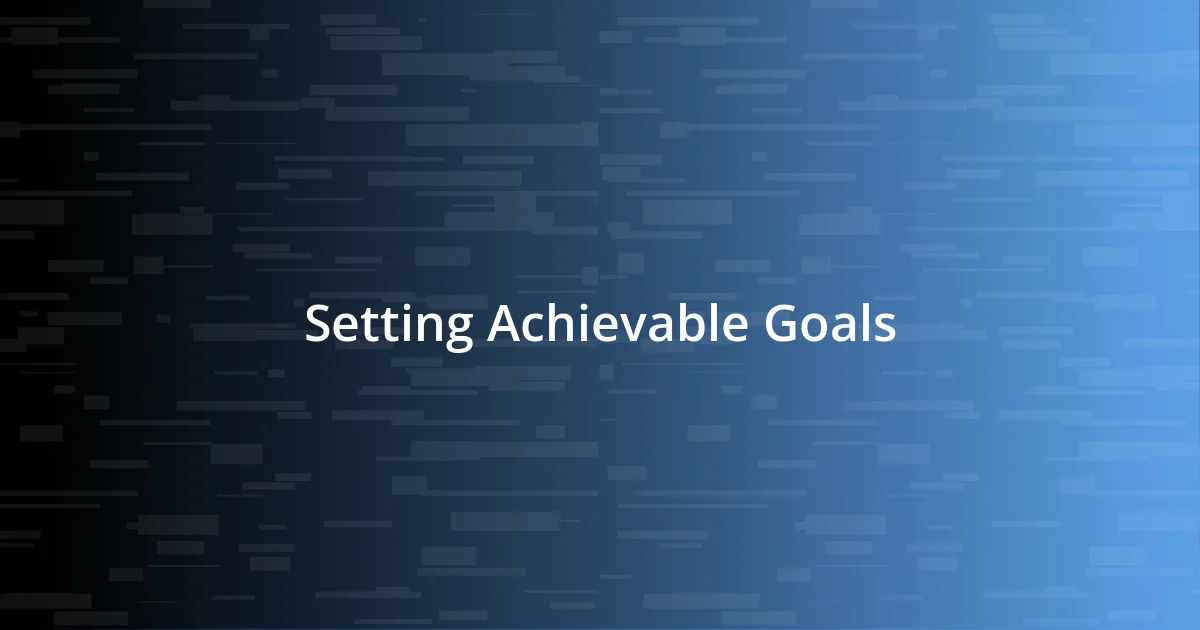
Setting Achievable Goals
Setting achievable goals is crucial when navigating physical limitations. Early in my recovery, I learned that clarity in what I wanted to accomplish helped to keep my spirits high. For instance, instead of focusing on a distant goal like returning to hiking, I set smaller, attainable objectives, such as walking for five minutes a day. This shift in perspective mattered immensely; it turned daunting aspirations into manageable steps.
- Identify short-term objectives that lead to long-term success.
- Celebrate even the smallest achievements to boost your motivation.
- Break down larger goals into specific, measurable actions.
- Keep a journal to track progress and reflect on emotional growth.
- Share your goals with supportive friends or family to foster accountability.
I can vividly recall the day I broke my walking time record. It wasn’t just about the minutes; it encapsulated my determination to reclaim a part of my former self. I felt euphoric, as if each step released the weight of my frustration. By creating and focusing on these smaller goals, I transformed my once-bleak outlook into an uplifting journey, empowering me to embrace each minute as a victory.
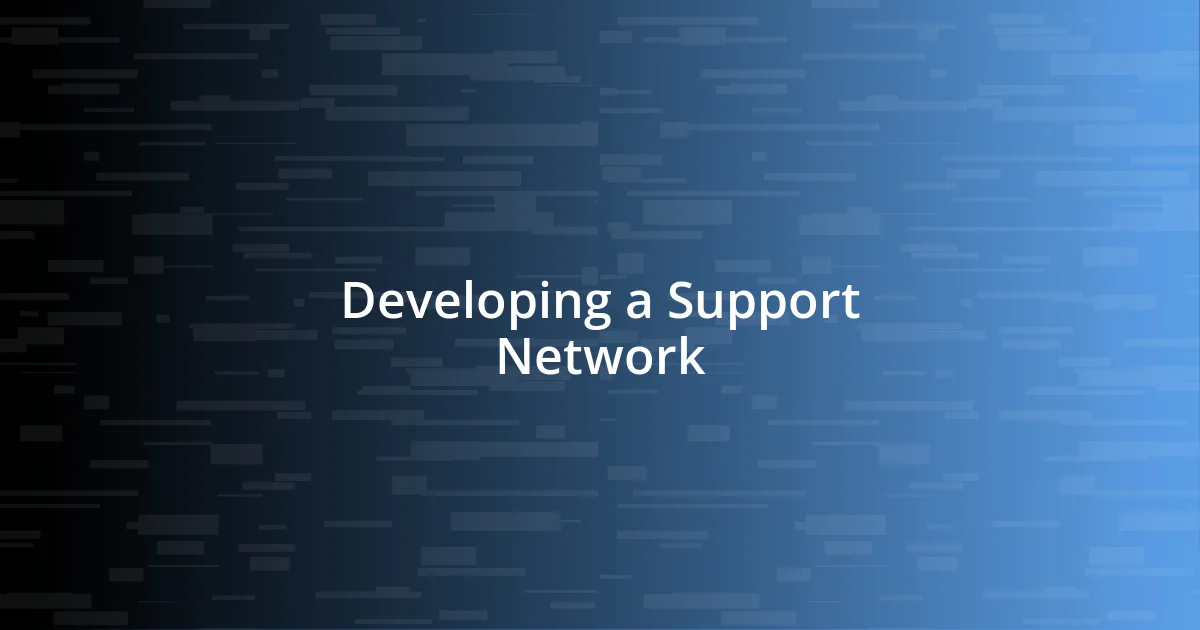
Developing a Support Network
Building a support network was one of the most pivotal steps in my journey. I distinctly remember attending a local support group, feeling a mix of apprehension and curiosity. Listening to others share their stories reminded me that I wasn’t alone; everyone had their unique struggles, and each voice carried lessons. It sparked a realization: sharing my experiences not only eased my burden but also connected me with individuals who understood the nuances of my journey.
In the early days, reaching out was challenging. I often wondered, “Will they understand what I’m going through?” But, surprisingly, opening up led to strengthened bonds. A close friend of mine, whom I met through a community event, shared how her own physical challenges inspired her art. Her passion helped me to channel my own frustrations into creative writing, which became a therapeutic outlet. These interactions underscored that a support network isn’t just about shared experiences but also about collective growth.
Moreover, I found that my support network doubled as a constant source of motivation. I remember a moment when a fellow member of my group set a physical challenge for us—completing a fun walk. At first, I hesitated, questioning my abilities, but the encouragement from my peers pushed me to join. Completing that walk not only boosted my confidence but reminded me of the power of communal encouragement. Have you ever experienced that contagious energy when surrounded by supportive individuals? It’s a game changer, isn’t it?
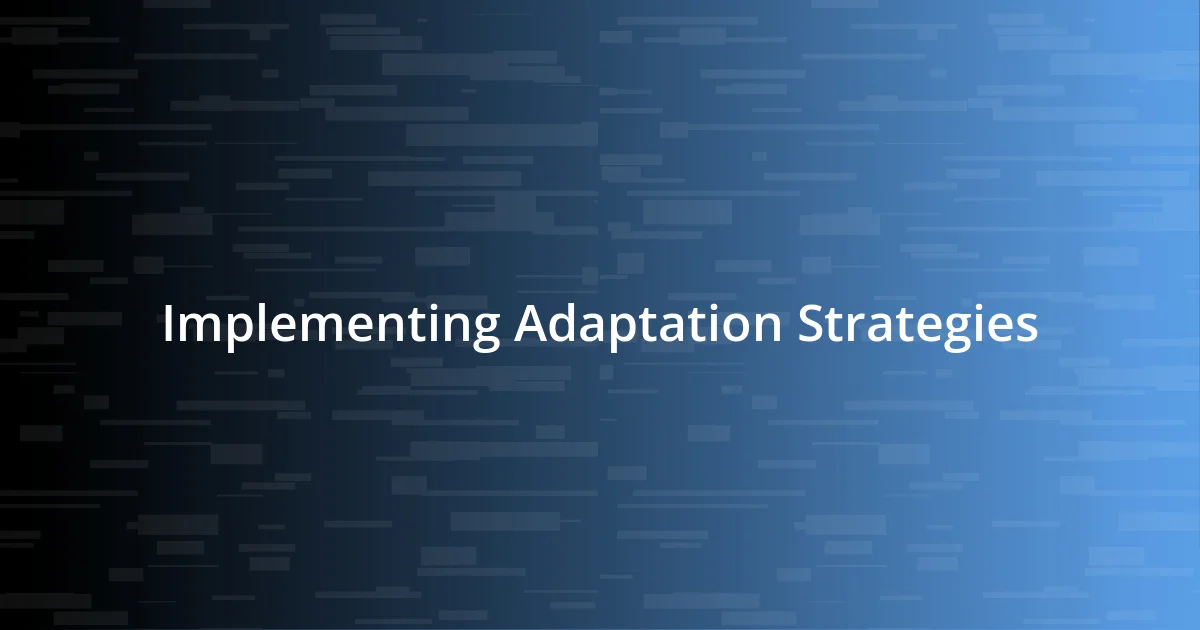
Implementing Adaptation Strategies
Implementing adaptation strategies involved adjusting both my mindset and my routine. I remember the moment I decided to use assistive devices, which was a significant transition for me. At first, I felt hesitant, questioning whether I was giving in to my limitations. But then, I realized these tools weren’t crutches; they were enhancements to my independence. Embracing this shift allowed me to approach daily tasks with renewed confidence.
I also discovered the importance of routine in my adaptation process. Instead of letting unpredictability dictate my days, I structured my activities around my energy levels. By identifying peak times for my physical capabilities, I could maximize my productivity and enjoyment. For example, I chose mornings for my exercise sessions when I felt most energetic. Hasn’t it ever struck you how small adjustments can lead to significant changes? When I made these simple tweaks, I noticed an uplifting change in both my spirit and performance.
Lastly, I adopted a mindset of flexibility. Adaptation isn’t a one-size-fits-all strategy; it requires a willingness to experiment. I experimented with various techniques like meditation and breathing exercises to manage stress and improve my focus. Sometimes, I’d sit quietly for a few minutes, embracing the stillness, which surprisingly connected me deeper with my thoughts and intentions. Each strategy was a step in my personal evolution, helping me embrace the unexpected twists in my journey.
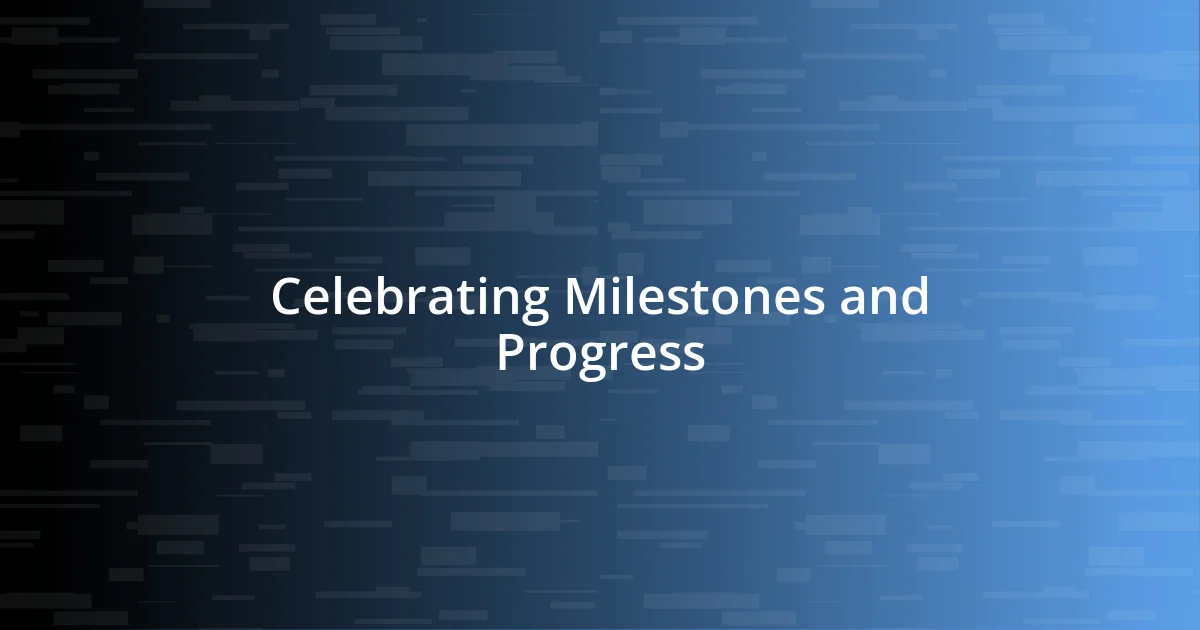
Celebrating Milestones and Progress
Celebrating milestones has been one of the most uplifting aspects of my journey. I vividly remember the day I hit a personal goal: climbing a small hill that once felt insurmountable. I stood at the top, breathless but exhilarated, and couldn’t help but shout in joy. In that moment, I realized that every small step I took, whether it was getting out of bed on a tough day or taking a few more steps than the day before, deserved acknowledgment. Don’t you think it’s vital to recognize these victories, no matter how small?
As I continued to measure my progress, I discovered the joy of creating a milestone journal. Each page became a canvas where I documented not just physical achievements but emotional breakthroughs. For instance, the first time I shared my journey on social media felt monumental. I received messages of encouragement and camaraderie, which fueled my motivation further. I often asked myself, “What does progress really mean to me?” Through this reflection, I found that it’s not only about physical gains but also about embracing vulnerability and sharing my story with others. Isn’t it amazing how milestones are as much about connection as they are about personal achievements?
Moreover, the practice of celebrating milestones reshaped my outlook on setbacks. There was a time when I struggled after missing a target; it felt disheartening, to say the least. But rather than dwelling on the disappointment, I turned my focus to the small wins I’d gathered along the way. I recalled how I had, for instance, completed a series of exercises despite feeling fatigued. That shift in perspective transformed my relationship with progress. It taught me that every step forward is worth celebrating, and there’s beauty in appreciating the journey itself. How do you perceive your own moments of progress?
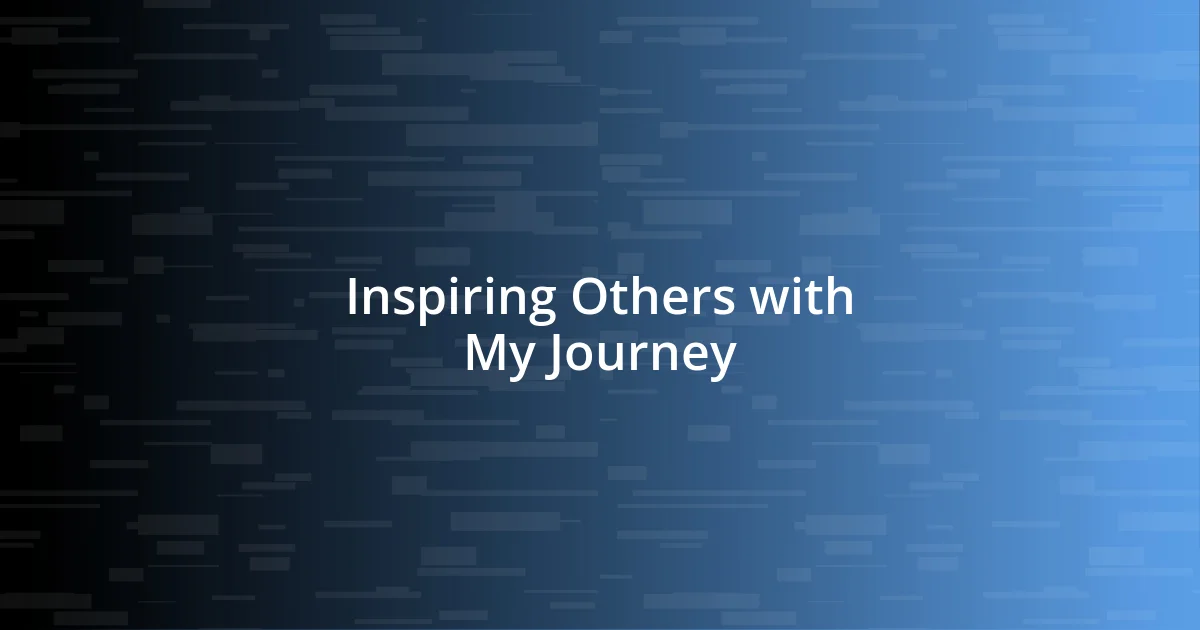
Inspiring Others with My Journey
In sharing my journey, I’ve discovered that vulnerability can create a powerful connection. I recall the time I spoke at a local community center about my experiences. As I opened up about my struggles and triumphs, I saw the audience lean in, engaged and reflective. It struck me how many shared similar feelings of doubt or fear. Have you ever felt that surge of energy in a room, knowing your story resonates? That night, I realized inspiring others isn’t about presenting a polished version of success; it’s about being real and relatable.
One instance that truly inspired others involved my decision to participate in a local fun run. The day before, I felt a mix of excitement and trepidation; could I truly finish the race? Despite my self-doubt, crossing that finish line, even at my own pace, brought overwhelming joy. As I looked around, many were cheering, and a few even came up to share their own stories of challenges. Isn’t it incredible how one act of courage can ignite others to share their own journeys? I realized then that my experiences could light the way for someone else.
Every time I receive a message from someone touched by my journey, it reinforces why I share my story. A few months ago, I received a heartfelt note from a young athlete who felt discouraged after an injury. She told me my posts motivated her to see her limitations as mere challenges. That made me reflect: how often do we underestimate the impact of our own stories? I cherish each interaction, knowing we’re creating a community of resilience and support. It’s in these moments that I find the true power of inspiration—it’s not just about my journey, but how it intertwines with the journeys of others.












